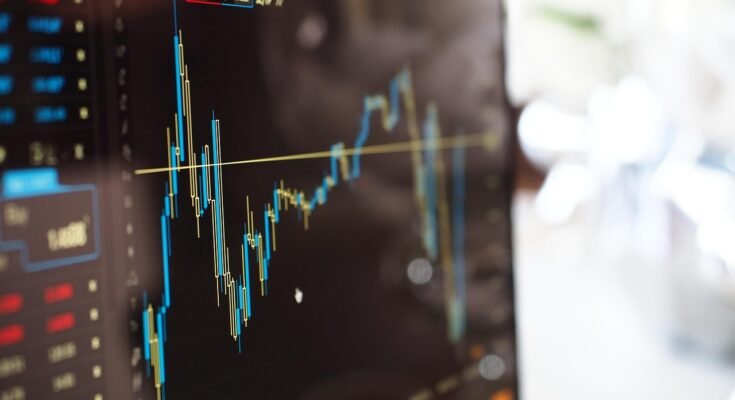The financial trading landscape has undergone a significant transformation with the emergence of AI trading platforms. These platforms leverage artificial intelligence to execute trades, analyze market trends, and make data-driven decisions at speeds no human trader can match. For trading company, integrating AI has become essential to maintaining a competitive edge in today’s fast-paced financial markets. This article explores the impact of AI trading platforms, their benefits, challenges, and the future of AI-driven trading.
Understanding AI Trading Platforms
Artificial intelligence has significantly influenced the financial sector, particularly in trading. AI trading platform use advanced algorithms and data-driven methodologies to enhance trading performance. By automating processes, these platforms help traders and companies maximize profits, minimize risks, and execute trades with unparalleled efficiency. Unlike traditional trading methods that rely on human intuition and manual analysis, AI trading platforms process vast amounts of data in real time, allowing for rapid and informed decision-making.
AI trading platforms have become indispensable for institutional investors, hedge funds, and retail traders alike. They offer predictive analytics, pattern recognition, and automated trading strategies that adapt to market conditions. The integration of machine learning and big data analytics enables these platforms to continuously learn from market behavior, improving accuracy over time. As a result, AI trading platforms are not just tools but strategic assets that redefine how trading companies operate.
What Is an AI Trading Platform?
An AI trading platform is a system that uses machine learning, data analytics, and automation to analyze financial markets and execute trades. These platforms process vast amounts of data in real time, identifying patterns and opportunities that may be difficult for human traders to spot. AI trading platforms come in various forms, including algorithmic trading systems, robo-advisors, and high-frequency trading (HFT) solutions.
AI trading platforms can be categorized into several types:
- Algorithmic Trading Platforms: These systems follow predefined rules and mathematical models to execute trades automatically. They are commonly used by institutional investors for high-speed trading.
- Robo-Advisors: AI-driven investment platforms that offer automated financial planning services based on users’ risk tolerance and financial goals.
- High-Frequency Trading (HFT) Systems: Utilize complex algorithms to execute thousands of trades in fractions of a second, capitalizing on small price fluctuations.
- Sentiment Analysis Tools: AI-powered platforms that analyze news articles, social media posts, and financial reports to assess market sentiment and predict price movements.
How AI Trading Platforms Work
AI trading platforms utilize machine learning algorithms to assess historical data, monitor live market conditions, and predict potential price movements. These platforms rely on several advanced technologies to operate effectively:
- Natural Language Processing (NLP): NLP enables AI trading platforms to extract insights from unstructured data such as news articles, analyst reports, earnings call transcripts, and social media discussions. By analyzing this data, AI can gauge investor sentiment and anticipate market shifts.
- Deep Learning and Neural Networks: These advanced AI techniques help identify complex patterns in trading data, allowing the system to refine its strategies and improve predictive accuracy over time.
- Predictive Analytics: AI-powered predictive analytics uses historical and real-time data to forecast price movements, helping traders make informed decisions.
- Reinforcement Learning: Some AI trading platforms use reinforcement learning, where the system continuously learns and adapts to changing market conditions through trial and error.
- Automation and Execution: AI trading platforms execute trades at lightning speed without human intervention, reducing reaction time to market changes and improving overall efficiency.
Key Components of AI Trading Platforms
AI trading platforms consist of several key components that enable their functionality:
- Data Aggregation and Processing: Collects and processes vast amounts of market data, including stock prices, trading volumes, economic indicators, and news sentiment.
- Trading Strategy Development: AI systems generate and refine trading strategies based on historical and real-time market data.
- Risk Management: AI trading platforms incorporate risk assessment models to minimize potential losses by setting stop-loss limits and hedging against adverse market movements.
- Order Execution Engine: Executes trades automatically, ensuring speed and accuracy in trade execution.
- Performance Monitoring and Optimization: AI continuously monitors its own performance, adjusting trading strategies to enhance profitability and reduce risks.
Advantages of AI Trading Platforms Over Traditional Trading
- Speed and Efficiency: AI trading platforms execute trades in milliseconds, far faster than human traders.
- Data-Driven Decision Making: AI can analyze enormous datasets, providing insights that would take humans significantly longer to process.
- Reduced Human Emotion in Trading: AI eliminates emotional biases, leading to more rational and disciplined trading strategies.
- Scalability: AI trading platforms can handle large volumes of transactions simultaneously, making them suitable for institutional traders and hedge funds.
As AI trading platforms continue to evolve, their capabilities will expand, further revolutionizing the way financial markets operate.
The Role of AI Trading Platforms in Trading Companies
AI trading platforms play an increasingly important role in the operations of modern trading companies. These companies leverage AI to optimize trading performance, reduce risk, and enhance profitability. By automating key processes, AI-powered systems allow firms to allocate resources more effectively and respond to market changes with greater agility. With growing adoption, AI is becoming a fundamental component of trading companies’ business models.
Furthermore, AI trading platforms provide trading companies with a competitive edge by improving decision-making and operational efficiency. These platforms can analyze vast amounts of market data in real time, enabling firms to anticipate trends, identify investment opportunities, and manage risks more effectively. By incorporating AI, trading companies are able to operate more strategically and efficiently in an increasingly complex financial landscape.
Enhancing Decision-Making
Trading companies rely on AI-driven insights to make informed trading decisions. By analyzing vast amounts of structured and unstructured data, AI trading platforms offer predictive analytics that help traders capitalize on market opportunities.
Improving Trading Efficiency
AI trading platforms reduce human errors, minimize emotional trading decisions, and execute trades faster than human traders. This leads to improved efficiency, reduced transaction costs, and increased profitability for trading companies.
Risk Management and Fraud Detection
AI-powered platforms are excellent at detecting anomalies, identifying fraudulent activities, and managing trading risks. By continuously monitoring market conditions, they can alert traders to potential risks and prevent losses.
Customization and Strategy Development
AI trading platforms allow trading companies to develop and customize strategies based on historical data and market trends. These strategies can be backtested to ensure effectiveness before real-world implementation.
Benefits of AI Trading Platforms
AI trading platforms offer a wide range of benefits that improve the overall trading experience for individuals and companies alike. By integrating artificial intelligence into trading strategies, traders gain access to more accurate insights, real-time market analysis, and automated execution capabilities. These advantages make AI trading platforms a game-changer in the financial industry.
One of the most significant benefits of AI trading platforms is their ability to enhance precision and eliminate human error. Unlike traditional trading, which is often influenced by emotions and cognitive biases, AI-driven trading ensures objective decision-making based on data. Additionally, AI systems continuously learn and refine their strategies, adapting to market fluctuations and improving performance over time.
1. Speed and Accuracy
AI trading platforms can process market data and execute trades in milliseconds, ensuring traders capitalize on the best opportunities instantly.
2. Data-Driven Insights
These platforms analyze massive datasets to identify profitable trends, reducing reliance on intuition-based trading.
3. Reduced Emotional Trading
Emotions such as fear and greed often lead to poor trading decisions. AI trading platforms eliminate emotional biases by making data-driven decisions.
4. 24/7 Trading Capability
Unlike human traders, AI trading platforms operate round the clock, ensuring no market opportunity is missed.
5. Cost Efficiency
AI-driven automation reduces labor costs for trading companies, enabling them to maximize profitability.
Challenges and Risks of AI Trading Platforms
While AI trading platforms offer numerous advantages, they also present significant challenges and risks. One of the primary concerns is the reliance on algorithms that may fail under unprecedented market conditions. If AI models are trained on historical data that does not account for rare financial crises, they may struggle to adapt to unexpected scenarios, leading to substantial losses.
Another challenge is the potential for over-reliance on automation, which can reduce human oversight. While AI-driven systems excel at rapid decision-making, they may lack the intuition and contextual understanding that experienced human traders bring to the table. Striking the right balance between AI automation and human intervention remains a critical factor in ensuring sustainable trading success.
1. Data Quality and Availability
AI trading platforms require high-quality and extensive datasets for accurate predictions. Poor or incomplete data can lead to inaccurate trading decisions.
2. Market Volatility
While AI trading platforms excel in stable markets, extreme volatility can challenge even the most advanced algorithms.
3. Regulatory Compliance
Trading companies using AI must comply with financial regulations, which vary by country and market.
4. Over-Reliance on Technology
Excessive dependence on AI trading platforms may lead to vulnerabilities if technical failures occur.
5. Cybersecurity Risks
AI trading platforms are susceptible to cyber threats. Trading companies must implement strong security measures to protect against hacking and data breaches.
The Future of AI in Trading Companies
The future of AI in trading companies is poised for remarkable advancements as technology continues to evolve. AI-driven trading is expected to become even more sophisticated, incorporating deeper machine learning techniques, quantum computing, and blockchain integration. These innovations will further enhance predictive accuracy, security, and execution speed, creating a more efficient and transparent financial ecosystem.
Increased Adoption of AI Trading Platforms
More trading companies are expected to integrate AI as technology advances. AI trading platforms will become even more sophisticated, providing deeper insights and more effective trading strategies.
AI and Blockchain Integration
The combination of AI and blockchain technology will enhance transparency and security in trading activities.
Evolution of Predictive Analytics
As AI models improve, predictive analytics will become more accurate, enabling trading companies to make even better market predictions.
Expansion of AI Trading to Retail Investors
AI trading is no longer limited to institutional investors. More retail traders will gain access to AI-driven tools, democratizing trading opportunities.
Conclusion
AI trading platforms are reshaping the trading landscape by providing faster, smarter, and more efficient ways to trade. For trading companies, AI is no longer a luxury but a necessity for staying competitive. While challenges remain, the future of AI-driven trading looks promising, with continued advancements in machine learning and data analytics paving the way for even greater innovations in the financial markets.




